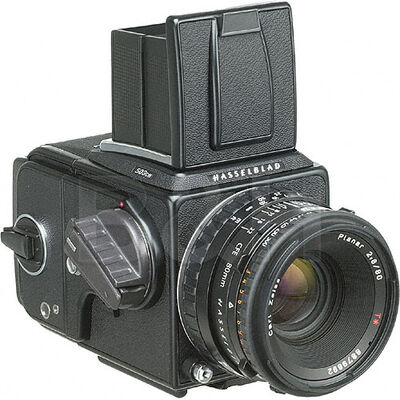Rant for all Eternity — Did you read it?
Jan 25, 2024 09:04:29 #
DaveyDitzer
Loc: Western PA
[quote=burkphoto. (Why are so many car dealers terrible salespeople?)[/quote]
It's all about the cost to the dealer and incentives to the sales force (move the metal!). The sales manager is trying to get rid of slow moving inventory at the highest markup he or she can get away with. End of the month mfr. incentives also motivate the sales manager. Usually the sales people are paid very little or not at all so the cost to the dealer is low and the strife between sales people can be brutal. I just control the conversation and focus on what I want to know.
It's all about the cost to the dealer and incentives to the sales force (move the metal!). The sales manager is trying to get rid of slow moving inventory at the highest markup he or she can get away with. End of the month mfr. incentives also motivate the sales manager. Usually the sales people are paid very little or not at all so the cost to the dealer is low and the strife between sales people can be brutal. I just control the conversation and focus on what I want to know.
Jan 25, 2024 09:20:41 #
Jan 25, 2024 11:33:07 #
I guess I'm a little on the Geek side. I've had four Sony DSLR's and two SLT's over the years and have read the manual that came with the camera if there was one and purchased several on the open market. I'm look at three right now that are over an inch thick and I've read them from cover to cover and still go back and read various sections when the need arises. I believe that if you don't know your camera, all you do is take snapshots.
Jan 25, 2024 12:09:21 #
burkphoto wrote:
The finance guys are the worst. They're sharks who want to sell you loans with outrageous rates, or add-on warranties that cost a fortune, or service plans that are overpriced. I buy Toyota products, and I have good credit, so I negotiate the rate down, skip the warranties, and take my car to an independent garage...
Some people pay 20% more for their cars than they have to.
Some people pay 20% more for their cars than they have to.
I was ready to write a check. I wound up with a Hyundai Tucson Limited. It has a 5 year bumper to bumper w/ 10 year drive train warranty. The drive train is US built and overall it is 50% US, built in Alabama.
The technology is amazing. I don't know how new it is, but more than I ever had. A great safety feature, any movement in the back if you lock the car and walk away sets off an alarm. No babies left behind.
---
Jan 25, 2024 13:03:27 #
Thorny Devil wrote:
…it was not what I wrote, it was what I didn't write that determined a satisfactory result or otherwise…
I know that one well. I created primarily technical, procedural, software, photography, and field operations training materials, but worked for a training director who was sales oriented. It was a constant battle to convince him I was right to include detail he wanted to leave out.
My favorite "attaboy" of all time, one that calmed down my director and gave him a reality check, came from a territory manager in upstate New York. She said, "Man, Bill, the volume of your training kit is intimidating at first, but it really isn't. Once we dug into it, we learned there is no fluff. It's all important. The quality of our work and our efficiency improved immediately after we trained the staff this year."
Paranoia about leaving out important details is a virtue. Make things as simple as possible, but no simpler.
Jan 25, 2024 13:15:47 #
DaveyDitzer wrote:
It's all about the cost to the dealer and incentives to the sales force (move the metal!). The sales manager is trying to get rid of slow moving inventory at the highest markup he or she can get away with. End of the month mfr. incentives also motivate the sales manager. Usually the sales people are paid very little or not at all so the cost to the dealer is low and the strife between sales people can be brutal. I just control the conversation and focus on what I want to know.
Part of my role in training was to train salespeople. We taught a consultative sales system from Achieve Global, called Professional Selling Skills. The essence of PSS was research — understanding a client's circumstances, wants, needs, hopes, dreams, and desires, and then catering a targeted palette of product features and benefits specifically to those circumstances and motivations. It put the emphasis on solving problems, providing solutions, making the client's life easier, and getting on the same side of the table to push problems off the other side.
Car salespeople have always seemed to be about what THEY want. They tend to use fear to get it. That's incredibly offensive to me. If I want a Prius, don't try to interest me in a Tundra pickup. Show me the friggin' Prius and be done with it. I'll rent the truck on the five or six days in ten years when I need it.
Jan 25, 2024 13:44:51 #
Bohica
Loc: SE Coast of NC
jlg1000 wrote:
I am an Engineer. br So much of my time is spent r... (show quote)
I always look up the manual before I buy, doesn' always make it easier to understand
Jan 25, 2024 14:16:17 #
burkphoto wrote:
Taking responsibility for what we buy and use is, ... (show quote)
Very interesting and factual. Compare the manual that came with my 1967 Nikon F to the one that came with my D-750. Have I read the whole manual? HA! But I did read most of David Busch’s manual for the camera and I think it is even larger.
Jan 25, 2024 14:26:52 #
Mduffy910
Loc: Michigan
My family used to laugh at me cuz I always wanted to read the manual or instructions first. Unfortunately I think I grew out of that because most real manuals are, as you eluded to, "long" and somewhat tedious to wade through. I agree we do need to go back to what the manufacturer worked so diligently on, read it, and use it.
Jan 25, 2024 14:28:09 #
Jan 25, 2024 15:02:32 #
E.L.. Shapiro wrote:
In days of old when knights were bold...photoghay ... (show quote)
I want to thank burkphoto for his raising this issue--that mastering technology isn't easy. And thanks to E. L. Shapino and others for their insights. But I would also like to point out that inventing camera equipment isn't easy.
my grandfather worked for Thomas Edison, Henry Ford and worked with Nicola Tesla. George Eastman came to Thomas Edison and asked him to help develop a better camera. Kodak's Customers had to send in their camera back to Kodak develop the pictures. So Edison punched holes in the film so it could be indexed and developed the sprocket system to uniformly advance the film. Edison went on to develop the motion picture technology. He developed and patented the phonograph when he was deaf in one ear and partially in the other ear. He had to depend on his technicians to tell him if the products worked, He has the most US patents--1093 of any individual.
The point is that the folks inventing the new camera products are making stuff that even they may not know what the best way to use this stuff is. So it is up to us to figure out what the best way is to use our cameras.
Jan 25, 2024 15:15:11 #
I couldn't agree more.
One additional thought, and I will use my iPhone as an example. When a company has you install an update to their OS, there should be a link, at restart, that forces one to learn all the changes that were made. I find it infuriating when some focus group drove the manufacturer to change a simple design into something the group thinks is "cooler" or more visually impressive. Often this results in a loss of functional simplicity and this demands a relearning of the task to fit the new design.
We used to have an old expression: if it ain't broke, don't fix it!
I guess this also is too much work.
Nice rant!!
One additional thought, and I will use my iPhone as an example. When a company has you install an update to their OS, there should be a link, at restart, that forces one to learn all the changes that were made. I find it infuriating when some focus group drove the manufacturer to change a simple design into something the group thinks is "cooler" or more visually impressive. Often this results in a loss of functional simplicity and this demands a relearning of the task to fit the new design.
We used to have an old expression: if it ain't broke, don't fix it!
I guess this also is too much work.
Nice rant!!
Jan 25, 2024 22:57:13 #
bikinkawboy wrote:
Truths of modern times. And I will add that software does not always provide the right answer. Sanity checking is always required.... If they don’t understand what’s going on they ... (show quote)
Jan 25, 2024 22:59:36 #
pdsdville wrote:
What is an SLT?I guess I'm a little on the Geek side. I've had four Sony DSLR's and two SLT's over the years and have read the manual that came with the camera if there was one and purchased several on the open market. I'm look at three right now that are over an inch thick and I've read them from cover to cover and still go back and read various sections when the need arises. I believe that if you don't know your camera, all you do is take snapshots.
Jan 25, 2024 23:01:30 #
HRoss wrote:
Totally agree. I think that there should be a law, software updates, except for security updates, must be optional. And in that law there are significant $ penalties for companies who try to sneak functional updates under the guise of security. "That's not funny".I couldn't agree more. br br One additional thou... (show quote)
If you want to reply, then register here. Registration is free and your account is created instantly, so you can post right away.





 8:15 PM 2024/23/01 Rant (2) Over!
8:15 PM 2024/23/01 Rant (2) Over!
